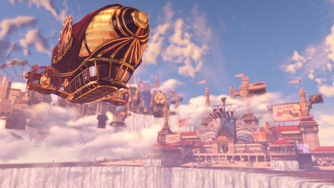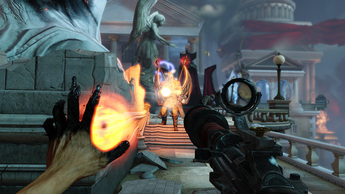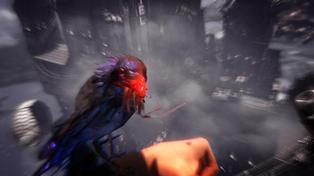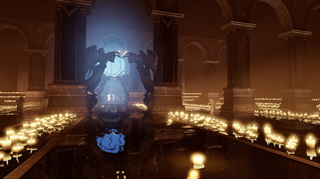
Intensely imaginative and tantalizingly mysterious, Infinite's first hour has the same mesmerizing quality of your most puzzling dreams. Developer Irrational Games leaves small strands of logic here and there, each immensely enticing but always elusive. Your brain will cling to what it can while these in-game images last, before they (quite literally) dissolve before your eyes.
Players control compulsive-gambler-with-cookie-cutter-good-looks Booker DeWitt, who's been given simple, ominous instructions: Bring us the girl; wipe away the debt. He's taken to a lighthouse amidst heavy rain and a bit of amused, cryptic banter between his escorts. After climbing the lighthouse steps past a grisly execution scene, he finds a contraption much like The Great Glass Elevator (Charlie and The Chocolate Factory). The pod whisks him up and up and up as the thunder booms and the blackness grows, until all at once he bursts through to a bright, gorgeous city in the clouds. Briefly relieved, Booker soon feels a tinge of uneasiness. Even as they welcome Booker to the city, the cheerful citizens mention a guiding figure called The Prophet. Booker quickly discovers his task will be far, far more complicated than he first believed.

But Infinite is also stubborn. The game's proud commitment to the single-player experience deserves praise—too many modern games have thrown out narrative in favor of online mayhem—but its fierce dependence on familiar game mechanics becomes frustrating. At its mechanical core, Infinite is pure First-Person Shooter, which begins as a nuisance and becomes an outright shame. Irrational pairs nearly every dreamlike, exploratory sequence with a routine, gunslinging encounter. Within the game's final two hours, I'd be lucky to go two minutes without firing off another dozen rounds. It took years for science fiction filmmakers to move past martial arts after The Matrix (1999). With video games? Too often, Halo (2001) still provides the sci-fi gaming template.


Even so, as I sat—20 minutes later—still thinking over the game's fantastic conclusion, I remembered Roger Ebert's claim. Regardless of whether this is art, I thought, surely this has something in common with a great film. I certainly had a strong emotional response. But as I considered further, Ebert's assertion began to make more sense to me. Infinite may have a phenomenal story, but only within the context of its fellow video games. A month ago I lambasted Looper (a 2012 sci-fi film) for its irresponsible treatment of time travel. Infinite commits many of the same crimes, but I realized it didn't bother me nearly as much. Why was this?
Video games have two unique qualities largely absent from film. First, developers always design games so that the players will enjoy playing them. Of course, most summer blockbusters have this same goal, but in general, a film does not have to be enjoyable. A movie might be excruciating to watch, but because it evokes a profound emotional response, we judge the experience worthwhile. No one would choose to continue playing a 20-hour game she didn't like. Second, games can be beaten, while films cannot (one of Ebert's main points). If we want to judge films and video games based on their makers' intentions (apart from their intention to make money), then it makes sense that we would judge the two mediums differently.
Infinite's riskiest, most admirable choice was to try to succeed both as a game and as an interactive film. Without question, the game succeeds at the former task. But at the latter? If I force myself to apply the same critical rigor I do with film to Infinite's plot, I find myself much less enthusiastic. At the same time, it's probably unfair to apply these same standards. I loved the game for what it was, particularly in comparison to other games.
Is Bioshock Infinite a work of art? I'm not sure I can say. Is it diligently crafted, unbelievably fun, and one of the best games of the last several years? I say yes. And within the world of video games, that's a far more important question.


 RSS Feed
RSS Feed
